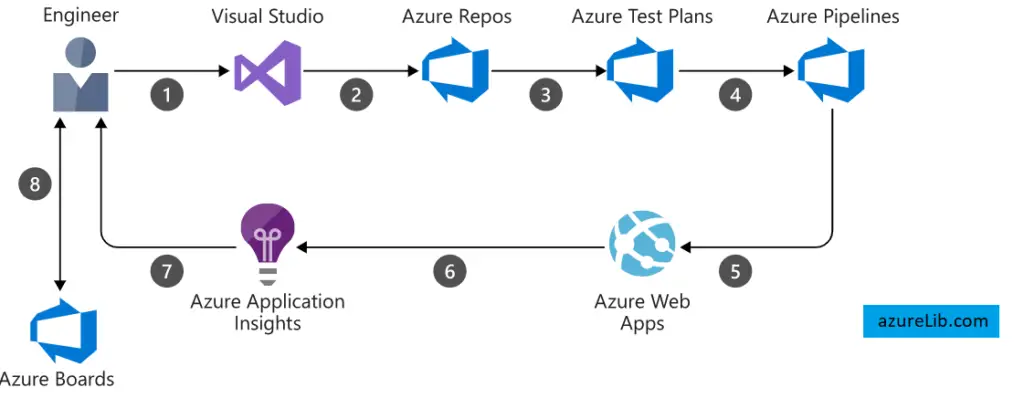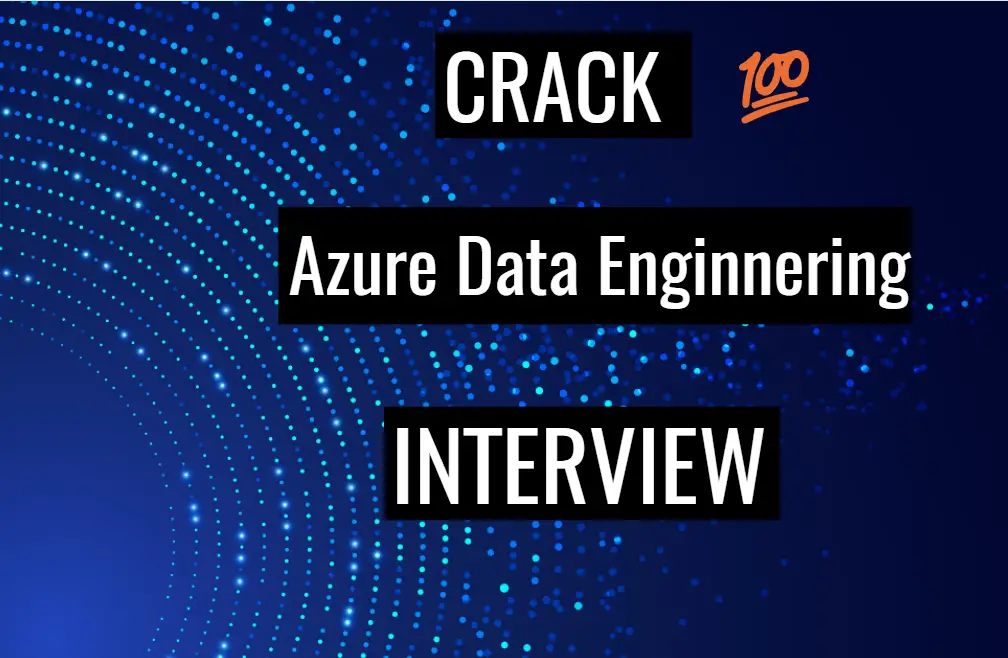You must have come across a couple of posts about the Azure devops interview questions and answer but none of them actually has been talking about the azure specific azure devops interview questions and answers. In this post, I will take you through the azure devops interview questions and answer for experienced azure devops engineer. It will also contains the azure pipeline interview question and answer, azure CI CD interview questions and answers, real time scenarios based interview questions.
Q.1 What is Azure DevOps?
Azure DevOps services is the service by Microsoft Azure which helps the organization to fast pace and plan, develop, manage, monitor and deploy the project more effectively and efficiently. It brings developers, managers and contributors on common platform to complete the projects. It produces the service over the cloud using the azure DevOps service and on on-premise location using the azure DevOps server.
It does mainly consist of list of individual services and client can chooses any one of them as per their need. List of services are as as:
- Azure Repos
- Azure Pipelines
- Azure Boards.
- Azure Test Plans
- Azure Artifacts


Q.2 What is Azure Repos?
Azure Repos is version control tool to help keep track your code and documents over the period of time. Version control is must to have for any project irrespective of the project team size. In day to day work developer/team member makes changes to the code frequently, azure repos can help in managing those changes and keep the thing organized. There are two types of the version control provided by the Azure repos:
Git
Team foundation version control (TFVC)
Q.3 What is Azure Git?
Azure Git is nothing but the same most popular standard Git, source version control. It is distributed version control system for example when you work on your local copy, which in itself is entire repository. Once you done with your changes you commit the changes locally and then merge your repo with the Git server i.e. master repository.
Q.4 What is Team foundation version control (TFVC)?
Team foundation version control is the centralized version control system where local copy contains only the single version of the file and server maintains the entire repository changes. Once the developer makes the changes the file needs to commit directly to the server.
Get Crack Azure Data Engineer Interview Course
– 125+ Interview questions
– 8 hrs long Pre- recorded video course
– Basic Interview Questions with video explanation
– Tough Interview Questions with video explanation
– Scenario based real world Questions with video explanation
– Practical/Machine/Written Test Interview Q&A
– Azure Architect Level Interview Questions
– Cheat sheets
– Life time access
– Continuous New Question Additions
Here is the link to get Azure Data Engineer prep Course
Q.5 What is Azure Boards?
Azure Boards service by Microsoft Azure is the agile dashboard service which helps you to plan track and manage the project for day day activities using the agile methodologies. It has native support for Scrum and Kanban. Azure boards consist of rich user interface based dashboard, there you can start tracking user stories, issues, bugs, and extract reports in quickest way possible.
Q.6 What is Azure Test Plans?
Azure Test Plans is service for quality assurance. An azure Test plan provides the rich powerful tool for the test management solution system. It provides systematic and well organized tool for creating test plan, creating test cases, run manual test cases and generate the report for test execution result.
Q.7 What is Azure Artifacts?
Azure Artifacts provides the capabilities to developers to consume and publish different types of packages to Artifacts feeds and public registries such as NuGet.org and npmjs.com. Azure Artifacts are used along with Azure Pipelines to deploy packages, publish build artifacts. Azure artifacts is also used to integrate files between azure pipeline stages to build, test, or deploy application.
Q.8 What is azure Pipelines?
Azure pipeline is one of the most important services among the Azure DevOps, it provides the continuous integration and continuous delivery of the code by build and deploy the code In the desired environment. It can work for any project irrespective of the technology and type of the project.
25 + Latest Azure Active Directory Interview Q&A
Q.9 Assume that you are a Azure DevOps engineer and working for XYZ organization. Organization is starting a new project which belongs to financial domain and tagged as confidential project. You have to choose DevOps solution from the Azure platform which one you will choose and why?
I will choose Azure DevOps server in this particular scenario instead of the Azure DevOps services. Reason is Azure DevOps server is on-premises offering by the Microsoft Azure. Hence the data of the project will remains inside the organization network itself, as this is the confidential project hence better to keep everything within the on-premises network.
Q.10 Assume that you are a Azure DevOps engineer and working for XYZ organization. Your team is working on project since a year now and project using the azure DevOps server. Now as organization’s strategic decision, project has to move from azure DevOps server to azure DevOps service. First of all is it possible to move the existing items from azure DevOps server to azure DevOps service. If yes then how?
Yes it is absolutely possible to move the existing project from the azure DevOps server to azure DevOps service. There could be three approaches for the migration.
Approach 1: is to choose the manually approach, where we can copy the source code and work items manually from the on-prem DevOps server to the cloud based azure DevOps service.
Approach 2: Microsoft azure has provided the dedicated migration tool for the azure DevOps migration. This is one of the best approaches. We can use data migration tool to do the migration.
Approach 3: We use the public API-based tools for higher fidelity migration.
Q.11 What are the different ways to connect to a project in Azure DevOps?
We can connect to Azure DevOps project by using the following ways:
- Access the azure DevOps through web portal
- Integrating with Visual Studio or Team Explorer
- Eclipse/Team Explorer Everywhere Integration
- Android Studio with the Azure DevOps Services Plug-in for Android Studio
- IntelliJ with the Azure DevOps Services Plug-in for IntelliJ
- Visual Studio Code

Q.12 Assume that you are Technical Architect and working for XYZ organization. You have on boarded a new developer in team. How would you ensure that whatever changes he will do, must get review and approve before the merging in the master repo.
I would block the direct commit to the master branch. For merging the changes developer will be asked to create their own feature branch on which he/she is working. Once they done with their changes then can raise the pull request for merging the changes in to the master branch. Any senior team member will review the code and approve it for merging in master branch.
Q.13 What are the prerequisite for Azure pipeline to setup continuous integration and delivery?
- You need a GitHub account, where you can create a repository.
- You need at least one Azure DevOps organization. It is free if you don’t have one you can create it anytime.
- You need have administrator role for the Azure DevOps project that you want to use.
- You should have access to run pipelines on Microsoft-hosted agents. It could be either paid parallel jobs or you can request a free tier.
Q.14 How would you create Azure pipeline using the command line interface (Azure CLI) ?
1. Fork the following repository into your GitHub account: https://github.com/MicrosoftDocs/pipelines-java
2. Clone the repo
3. Go to cloned directory
4. Create pipeline using command az pipelines create –name “First-Java.CI”
5. It may ask for authentication enter your username and password
6. It will ask to provide the service connection name, enter it. (service connection needed for the azure pipeline and git hub repo communication.
7. It will ask you enter the pipeline template name among the list. (for example node.js, asp.net, maven etc)
8. It will create the YAML and commit in repo.
9. Azure DevOps will automatically start a pipeline run. Wait for the run to finish.
Q.15 What is the azure cli command to run the pipeline ?
az pipelines run [–branch]
[–commit-id]
[–folder-path]
[–id]
[–name]
[–open]
[–org]
[–project]
[–variables]
Q.16 What is the azure cli command to update the pipeline ?
az pipelines update [–branch]
[–description]
[–id]
[–name]
[–new-folder-path]
[–new-name]
[–org]
[–project]
[–queue-id]
[–yaml-path]
Q.17 What is the azure cli command to view the pipeline ?
az pipelines show [–folder-path]
[–id]
[–name]
[–open]
[–org]
[–project]
Q.18 What is an organization in the Azure DevOps?
An organization in Azure DevOps is a by which you can organize and connect groups of related projects. Examples of this could be various departments within the company like sales, finance. We can also choose one organization for your entire company, or multiple organizations based on business units.
Q.19 How can you setup the notification in for work items, code, review , Pull request and build in Azure DevOps, so that team member can take corresponding action accordingly.
Email notification can be set for work items, PR and other azure DevOps related activities. For setting up the email notification we need to follow below mentioned steps:
Sign in to your organization (https://dev.azure.com/{yourorganization}).
Go to Project settings > Notifications.
Select New subscription.
Select the type of activity you want your team to be notified of.
Provide a description to help you identify the subscription later.
Choose which team members should receive a notification:
Choose whether you want to receive notifications about activity in all projects or only a specific project.
Optionally, configure additional filter criteria.
Select Finish to save the new subscription.
Q.20 What do you mean by Azure Pipeline agent?
In azure pipeline to build the code and to do deployment you need compute infrastructure, this computation power is provided by the agent. Hence to run the pipeline you need to have minimum one agent available. You many need to increase the number of agents based as the load increases. Agent is computing infrastructure with agent software installed on it.
Q.21 What are different Azure Pipelines agents?
Microsoft-hosted agents
Self-hosted agents
Q.22 What are Microsoft-hosted agents in Azure pipeline?
When you run your azure pipeline the job gets executed. Every job will run on the agent (i.e. the compute infrastructure). Microsoft itself provide the agents which is the virtual machine installed with agent software. If you opt for choosing the agent as Microsoft-hosted agents then everything will be taken care by the Microsoft from assigning the resource and installing the software and maintaining updates.
Q.23 What is self-hosted agent in Azure pipeline?
Self-hosted agent is the agent which you set up and manage on your own to run jobs. You choose to opt for self-hosted agents in Azure Pipelines when you want more control to install dependent software needed for your builds and deployments. Also, machine-level caches and configuration persist from run to run, which can boost speed.
Q.24. What do you mean by Parallel Jobs?
Number of jobs which you can run at the same time in your azure organization is termed as parallel jobs. If your azure organization is defined as single parallel job, it means you can run a single job at a time. When you have two or more jobs to run then only one will get executed and other has to wait for their turn which comes when first job completes. To run multiple jobs at the same time, you need multiple parallel jobs.
Q.25. What do you mean by system Capabilities and user Capabilities in azure pipeline?
In the self-hosted agent, it has a set of capabilities which defines what can be done by capabilities. Capabilities are name-value pairs which can be either automatically discovered by the agent software, in which case they are called system capabilities, or those that you define, called user capabilities. Agent software detect system capabilities like name of the machine, operating system type, and other software installed on the machine including environment variables registered.
Q.26 How you can view the list of agents using the Azure CLI command?
az pipelines agent list –pool-id
Referenced from https://docs.microsoft.com/en-us/azure
[–agent-name]
[–demands]
[–detect {false, true}]
[–include-assigned-request {false, true}]
[–include-capabilities {false, true}]
[–include-last-completed-request {false, true}]
[–org]
[–subscription]
Q.27 How you can view the details of agents using the Azure CLI command?
az pipelines agent show –agent-id
–pool-id
[–detect {false, true}]
[–include-assigned-request {false, true}]
[–include-capabilities {false, true}]
[–include-last-completed-request {false, true}]
[–org]
[–subscription]
Q.28 What are the different ways in which self hosted agent can be configured?
Self hosted agent can be configured in two ways either agent as service or as Agent as interactive process with auto logon enabled.
Q.29. What are the security risks associated with the agent as interactive process with auto logon enabled?
When we enable automatic logon or disable the screen saver, it will all make other users enable to walk up to the computer and use the account that automatically logs on. When we configure this way, we need to ensure that computer is physically protected.
Q.30 Assume that you are a Azure DevOps engineer and working for XYZ organization. Your project manager is forcing you to use Microsoft hosted agent for azure pipelines. However you think team should choose self hosted agent. What could be reason of your choice?
Microsoft hosted agent is the easy to set up but it has some limitation as well which are as follows:
Build duration: Assigning the build agent for the job can take up some time which can increase the build duration.
Disk space: In the hosted agents the amount of storage provided is fixed and sometime it won’t be good enough for large builds.
Interactivity: We can’t sign in to a hosted agent.
File shares: We can’t drop build artifacts to Universal Naming Convention (UNC) file shares.

You would also like to see these interview questions as well for your Azure Interview :
Azure Active Directory Interview Questions and Answers
Azure Data lake Interview Questions and Answers
Real time Azure Data factory Interview Questions and Answers
Azure Data Interview Questions and Answers
Azure Databricks Spark Tutorial
Azure Databricks Spark Interview Questions and Answers
Final Thoughts:
Azure DevOps is the new field and due to this there is shortage of resources available on the internet which needed for preparing for azure DevOps interviews. In this blog I tried to provide many real world scenario based interview questions and answers for experienced azure DevOps developer, engineer and architect. These set of questions is also good enough for 3 years experienced, 5 years experienced and 10 years experienced. This article is also good for azure DevOps testers as well. I will on adding few more questions in near time I would recommend you, to also grow the theoretical questions sum up in this linked article as well. Here : Mostly asked Azure Data Factory Interview Questions and Answers

